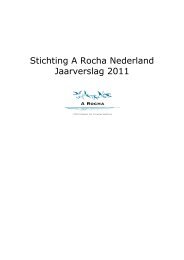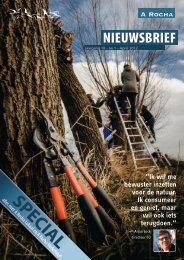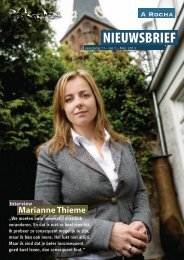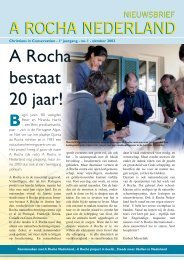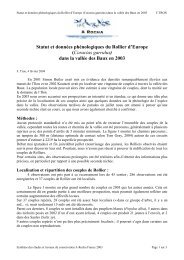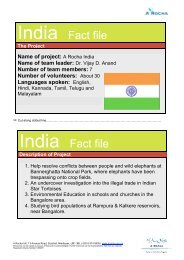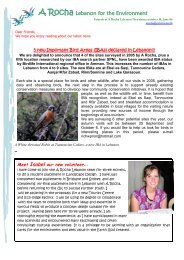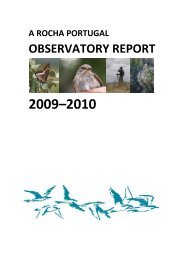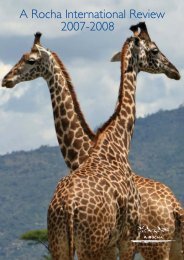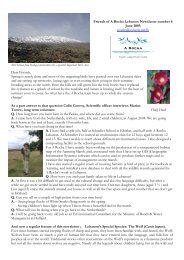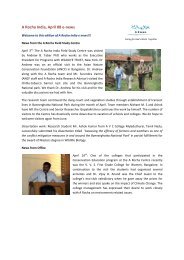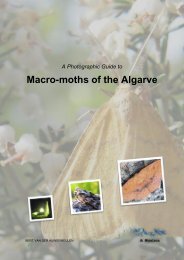A Rocha International Review 2010/2011
A Rocha International Review 2010/2011
A Rocha International Review 2010/2011
You also want an ePaper? Increase the reach of your titles
YUMPU automatically turns print PDFs into web optimized ePapers that Google loves.
A <strong>Rocha</strong> <strong>International</strong> <strong>Review</strong><br />
<strong>2010</strong>/<strong>2011</strong>
2<br />
About<br />
A <strong>Rocha</strong><br />
Our name<br />
The A <strong>Rocha</strong> story began with the establishment of a field<br />
study centre in Portugal in 1983 . The name is Portuguese and<br />
means ‘The Rock’.<br />
Where we work<br />
A <strong>Rocha</strong> has National Organizations in 19 countries: Brazil,<br />
Bulgaria, Canada, Czech Republic, Finland, France, Ghana,<br />
India, Kenya, Lebanon, Netherlands, New Zealand, Portugal,<br />
Peru, South Africa, Switzerland, Uganda, UK and USA.<br />
What we do<br />
A <strong>Rocha</strong> is an international Christian organisation which,<br />
inspired by God’s love, engages in scientific research,<br />
environmental education and community-based conservation<br />
projects.<br />
Who are we?<br />
Over the years we’ve used a myriad of stories and anecdotes to<br />
try and communicate who we are, what we do, and where we<br />
work. However, I wonder if these really capture what A <strong>Rocha</strong><br />
is at heart? The nature of our work: grassroots, communityled,<br />
country-specific, Christian-driven, scientifically rigorous<br />
and global, makes it hard to sum up A <strong>Rocha</strong> in a pithy one<br />
sentence catchphrase.<br />
A <strong>Rocha</strong>: our name is Portuguese, but our community conservation work is<br />
worldwide. Here, from a centre in the heart of Kampala slums, our small team is<br />
running conservation clubs where children learn to plant trees − and grow<br />
vegetables. (Bernard Madden)<br />
A <strong>Rocha</strong> began its work in Portugal, in 1983. This detail from a mural at<br />
the A <strong>Rocha</strong> Portugal field study centre shows some of the local birds in<br />
their habitats. Artwork: Catherine Hart. (Melissa Ong)<br />
Yet it’s important that you understand who we are and why<br />
A <strong>Rocha</strong> is unique and vital in today’s world. Our Founder,<br />
Peter Harris, always says, ‘The best way to learn about A <strong>Rocha</strong><br />
is to spend a year with us.’ Not helpful from a communications<br />
standpoint! Nevertheless, it captures the complexity of who we are.<br />
Our donors have always been an important part of who we<br />
are – and a recent survey has confirmed the much valued<br />
loyalty of our existing supporters. Towards the end of this year<br />
we’ll be launching a campaign aimed at attracting new donors<br />
from amongst the fast-growing groups who now follow our<br />
activities on the A <strong>Rocha</strong> website, Facebook and Twitter.<br />
We are determined to inspire the younger generation to catch<br />
our vision and realise that their support can help to extend our<br />
work into new areas.<br />
We invite you to continue getting to know us, through<br />
our newsletters, our website and social media. Or better<br />
by far, volunteer with us or enjoy a holiday at one of our field<br />
study centres.<br />
We also invite you to support us financially in whatever ways<br />
you can,<br />
Chris Naylor, Executive Director,<br />
A <strong>Rocha</strong> <strong>International</strong><br />
This report has been produced by the A <strong>Rocha</strong> <strong>International</strong><br />
Team whose role is:<br />
• To support the National Organizations by providing<br />
leadership and training programmes<br />
• To publicise the work at an international level<br />
• To foster the emergence of new A <strong>Rocha</strong> initiatives
Community-based<br />
conservation<br />
A <strong>Rocha</strong> works with communities to restore and<br />
protect threatened habitats and endangered wildlife. As<br />
conservationists, we know that the actions of any<br />
community, for better or worse, affect their local habitats,<br />
and without their engagement any improvement cannot<br />
be sustained. As Christians, we are committed to<br />
community conservation because we believe that God<br />
made human beings an integral part of the creation,<br />
dependent on its health and diversity, with special<br />
responsibility to care for it.We believe that although people<br />
often cause the problem, they can also be the solution.<br />
Case study: Protecting<br />
one of Africa’s most<br />
important forests<br />
The A <strong>Rocha</strong> Kenya field study centre, Mwamba, is on the<br />
coast and close to the Arabuko-Sokoke Forest, an Important<br />
Bird Area which is vital for six Globally Threatened Species.<br />
Having a permanent base here has enabled the team to build<br />
long-term relationships with local communities, and it became<br />
clear that a major reason for illegal logging in the forest was due<br />
to the need for local families to find cash for secondary school fees.<br />
A <strong>Rocha</strong> Kenya initiated the ASSETS eco-bursary scheme as a<br />
vital component of their community conservation programme.<br />
It provides grants of up to 90% of a youngster’s school fees.<br />
In return, parents agree not to log in the forest.<br />
In <strong>2010</strong>, 205 students received bursaries and 27 of these<br />
students were new, from eight primary schools.<br />
In April, with many of the newer students and parents in the<br />
audience, some of the older students debated the question,<br />
‘Should Arabuko-Sokoke Forest be cleared for farmland and<br />
settlement?’. Parents and youngsters participate in a range of<br />
educational and practical conservation activities which are<br />
changing attitudes and behaviour. In August, two summer clubs<br />
were run at Mwamba, each for 20 ASSETS students over three<br />
days. They were shown local wildlife, such as turtles, and<br />
snorkelled on the nearby reefs, seeing multitudes of brightly<br />
coloured fish and other marine life for the first time, which<br />
they described as a fantastic experience. They learned about<br />
local conservation issues and gained additional teaching about<br />
career opportunities and HIV & AIDS prevention.<br />
The major tree-planting event was at a secondary school in<br />
Mijomboni on the northern edge of the forest. ASSETS<br />
beneficiary parents, local church members and primary<br />
school children planted the highly valuable native hardwood<br />
Afzelia quanzensis. In addition,<br />
many familiesarelearninghowto<br />
growtrees for domestic needs on<br />
their own plots: fast-growing<br />
exotic species provide poles to<br />
rebuild their homes or sell for<br />
cash, relieving pressure on the<br />
forest, and the mangroves<br />
which protect the shore.<br />
An ASSETS internship<br />
programme was initiated at<br />
Mwamba, enabling two schoolleavers<br />
at a time to gain work<br />
experience: computer lessons,<br />
kitchen work, housekeeping,<br />
welcoming guests, working with<br />
tourists at the Gede Ruins<br />
Tree Platform and taking part<br />
in bird ringing and wildlife<br />
monitoring.<br />
The nearby Turtle Bay Beach<br />
Club also offers internships<br />
to ASSETS graduates. Whilst<br />
training in their Controls<br />
Department for eight months,<br />
Fauzia Mwanyule lived at<br />
Mwamba and secured<br />
sponsorship for her university<br />
education from some generous<br />
Mwamba guests.<br />
The income for ASSETS staff<br />
and fees comes from grants,<br />
individual donors and incomegenerating<br />
projects initiated by<br />
A <strong>Rocha</strong>, such as the provision<br />
of tree platforms and hides<br />
for tourists.<br />
The Narina Trogon Apaloderma narina<br />
hunts insects from the middle-level<br />
canopy of the Arabuko-Sokoke Forest<br />
and relies on natural tree cavities for<br />
nest sites. (Steffen Foerster)<br />
Arabuko-Sokoke Forest is now the<br />
largest stretch of coastal forest in<br />
Eastern Africa. (Dan Tay)<br />
Fauzia Mwanyule, an ASSETS graduate<br />
now studying at Kenyatta University,<br />
Nairobi.<br />
3
4<br />
Environmental<br />
education<br />
In <strong>2010</strong>, over 15,000 people, of all ages, took part<br />
in our Environmental Education (EE) programmes. The<br />
programmes are generally experiential, locally focussed and<br />
aimed at involving people in practical conservation<br />
projects. They are designed to meet local needs so<br />
the activities are highly diverse. Urban children watch<br />
and enjoy wildlife; in Kenya and India we facilitate the<br />
protection of threatened species and habitats; whilst in<br />
Peru, children are planting and learning to nurture forests.<br />
Case study: Providing<br />
training and resources<br />
for teachers in<br />
southern Portugal<br />
A <strong>Rocha</strong> Portugal runs a field study centre in the Algarve.<br />
The surroundings and the adjacent Alvor estuary are<br />
particularly rich in wildlife and there is easy access to dunes,<br />
mudflats and marshes in an area which is now heavily built up<br />
and developed for tourism.<br />
Each year about 1,000 school children visit to take part in<br />
outdoor activities based on the national science curriculum, led<br />
by A <strong>Rocha</strong> EE teachers. The children often watch bird<br />
ringing or release some of the moths which are regularly caught<br />
for identification and study.<br />
Vera Rolo<br />
The EE staff also train teachers from a wide range of<br />
disciplines as part of the Local Authority’s ‘Environmental<br />
Education by Art in the Algarve’ project. Teachers from across<br />
the region are led around the estuary where they are shown<br />
evidence of the economical, social, historical, biological,<br />
environmental and recreational importance of the Alvor.<br />
They also learn about some of the ecological relationships and<br />
adaptations of the local plants and animals. Isabel Soares,<br />
A <strong>Rocha</strong> Portugal’s EE Coordinator, says, ‘Our aim is to enable<br />
these teachers to creatively apply this knowledge in their<br />
educational activities and bring their students to visit Ria de<br />
Alvor. Since 2008, over 180 ‘Art in the Algarve’ teachers have<br />
received training with us.’<br />
Vera Rolo, who teaches Biology and Geology at<br />
Mexilhoeira Grande School, was interviewed by Isabel:<br />
Vera, why do you bring your students to A <strong>Rocha</strong>?<br />
‘Paula Banza, one of the A <strong>Rocha</strong> team, was a colleague when<br />
I taught in Lagos, so she invited me to visit the Ria de Alvor<br />
with her. I immediately scheduled outings for my 10th grade<br />
students because the resources you offered complemented the<br />
curricula for Biology and Geology. I now bring my 8th grade<br />
students each year.’<br />
In what ways do students benefit?<br />
‘The outdoor activities and the knowledge acquired play an<br />
essential role in helping them to understand the classwork.<br />
Outings bring the lessons to life. Many students change their<br />
behaviour, especially in relation to their ‘ecological footprint’.’<br />
How has A <strong>Rocha</strong> helped your own career<br />
development?<br />
‘A <strong>Rocha</strong> became important when I was<br />
preparing for my Masters Degree. Your<br />
Scientific Director helped me to choose the<br />
theme for my thesis: ‘Western Wetlands of Ria<br />
de Alvor’. He also helped me to identify<br />
wetland plants and locate relevant papers.<br />
A <strong>Rocha</strong> is an important resource for all the local<br />
science teachers, enabling us to continue learning<br />
and to keep up to date.<br />
I keep coming back here, not just because of<br />
the quality of the training for myself and my<br />
students, but also because of the kindness I’ve<br />
experienced and the warmth of the welcome.<br />
And, of course, Paula’s excellent cakes!’<br />
A <strong>Rocha</strong>’s field study centre beside the Ria de Alvor is a<br />
unique resource for schools who want their pupils to<br />
understand the biological richness of the local dunes,<br />
marshes and estuaries.
Scientific research<br />
A <strong>Rocha</strong> has field study centres in Canada,<br />
France, Portugal, Kenya, India, the UK and<br />
the Czech Republic.These centres enable the<br />
teams to undertake long-term research<br />
and monitoring programmes, often involving<br />
residential volunteers. Most of our research,<br />
whether or not based at a centre, aims to<br />
inform conservation priorities.<br />
Case study: Protecting<br />
remnant populations<br />
of Chimpanzees<br />
in Ghana<br />
A century ago, between one and two million Chimpanzees lived<br />
in 25 African countries. Today, the Chimpanzee is classified as<br />
Endangered, and in Ghana, where nearly 70% of the original<br />
Upper Guinean forest has been cleared, the Western<br />
Chimpanzee Pan troglodytes verus is extremely threatened through<br />
the loss and fragmentation of its habitats, as well as by<br />
trapping for the pet trade.<br />
A young Chimpanzee Pan troglodytes. (© Anup Shah/naturepl.com)<br />
Conservation of the remnant populations is hampered by a<br />
severe lack of data, so during 2009 and <strong>2010</strong>, A <strong>Rocha</strong> Ghana<br />
undertook systematic, standardised surveys in 14 areas of the<br />
Bia Goaso rainforests of SW Ghana, a region of some 5,000 km 2 .<br />
The primary aim was to determine the numbers and distribution<br />
of Chimpanzees, as well as other primates, and identify the<br />
most important sites for their survival. Following a preliminary<br />
period of reconnaissance and interviews with people living and<br />
working in the forest, two major surveys were undertaken: one<br />
in the wet season, the other in the dry season. Three teams of<br />
three people used existing trails so that they could move stealthily<br />
and maximise their direct encounters with the animals. They<br />
also cut 129 straight line transects, 1 km in length: this is a noisy,<br />
slow process, but is better for finding signs, such as chimp<br />
nests, footprints, dung and food remains.<br />
The survey indicated that there is still a small and scattered<br />
population of between 250 and 385 Chimpanzees in the study area.<br />
It identified key areas and shows how the existing network of<br />
Chimpanzee conservation sites could be improved by adding a<br />
corridor between the forests with the highest population densities.<br />
Recommendations have been made to reduce poaching and to<br />
provide strategically located water holes for use in the dry season.<br />
Since the Bia Goaso forests are part of a much more extensive<br />
patchwork of forest extending across the border into Côte<br />
d’Ivoire, the A <strong>Rocha</strong> Ghana team is also initiating collaborative<br />
projects with the Ivorian government, designed to halt the decline<br />
in Chimpanzees and Forest Elephants Loxodonta cyclotis across<br />
the region.<br />
5
6<br />
Financial <strong>Review</strong><br />
<strong>2010</strong><br />
South Africa 2%<br />
Peru 2%<br />
Czech Republic 2%<br />
Kenya 3%<br />
Portugal 3%<br />
Brazil 3%<br />
Ghana 3%<br />
USA 7%<br />
France 8%<br />
India 1%<br />
Lebanon 1%<br />
Netherlands 1%<br />
Uganda 1%<br />
UK 16%<br />
A <strong>Rocha</strong>’s Global<br />
Income & Expenditure<br />
ARI 29%<br />
Canada 17%<br />
Percentage of Global Income <strong>2010</strong><br />
We are grateful to be able to report that A <strong>Rocha</strong>’s<br />
global income has continued to grow: from £2.8<br />
million in 2009 to just over £3 million* in <strong>2010</strong>.<br />
The chart shows income received by A <strong>Rocha</strong><br />
<strong>International</strong> and each National Organization<br />
(except those whose income is under £15,000: Bulgaria,<br />
Finland, New Zealand and Switzerland).<br />
A <strong>Rocha</strong> <strong>International</strong> supports all the National Organizations<br />
in three key areas: by providing leadership and training<br />
programmes, by publicising the work at an international level<br />
and by fostering the emergence of new A <strong>Rocha</strong> initiatives.<br />
During <strong>2010</strong> A <strong>Rocha</strong> <strong>International</strong> also saw significant<br />
growth in its income due to a small number of highly<br />
committed donors. Because of this:<br />
• We made substantial grants to the National Organizations,<br />
funding key leadership posts in ten countries, totalling<br />
£249,500, targeted to increase their own ability to raise funds<br />
and undertake community conservation projects.<br />
• Each of the Directors visited National Teams to give support<br />
and training. Our Director of Finance and our Director of<br />
Science and Conservation provided training in Ghana and<br />
Kenya; our Director of Development worked closely with<br />
The Leaders’ Forum took place at the A <strong>Rocha</strong> France centre near Nice. (Dan Tay)<br />
colleagues in Canada and the USA; whilst our Executive<br />
Director visited the Czech Republic, Lebanon and France.<br />
• The Leaders’ Forum in June <strong>2010</strong> brought together our <strong>International</strong><br />
Trustees, <strong>International</strong> Team and over 50 A <strong>Rocha</strong><br />
leaders from around the world for consultations, teaching and<br />
the exchange of best practice.<br />
We are deeply grateful to all our donor partners<br />
around the world – whether churches, individuals,<br />
corporations, governments and/or institutions –<br />
for your on-going support and financial investment.<br />
We could not do the work without you!<br />
While our overall income over the last year was up, individual<br />
and church support was down. Trends continue to show that<br />
the economy is still striving to recover. Meanwhile, we are<br />
looking for ways to communicate more effectively with our<br />
supporters about our specific needs and how your financial<br />
support can make a difference.<br />
* These figures are based on management accounts as audited accounts for all National Organizations<br />
were not available at the time of going to press. The National Organizations are separate,<br />
independent legal entities. Their income is combined here to show the progress of the A <strong>Rocha</strong><br />
family as a whole.
(Melissa Ong)<br />
<strong>International</strong><br />
Trustees<br />
TheTrustees are responsible for safeguarding the values that underlie<br />
A <strong>Rocha</strong>'s mission and maintaining the integrity of the A <strong>Rocha</strong> family:<br />
Prof Sir Ghillean Prance, Chair Sarah French<br />
Dr Paul Kariya Paul Jeanson<br />
Ian Marlow Gerry Rawcliffe<br />
Steve Beck Dr Stella Simiyu<br />
The two newest Trustees are Rodney Green and Rebecca Irvin:<br />
Visit our website:<br />
www.arocha.org<br />
Rodney Green read Law and Theology at Cambridge<br />
University and has an Honorary LLD from De Montfort<br />
University for services to the community. He was Chief<br />
Executive of Leicester City Council from 1996 - 2008, during<br />
which time Leicester became the first European Sustainable<br />
City. Leicester is the UK’s most ethnically diverse city and<br />
Rodney was appointed by the government to the Migration<br />
Impacts Forum to lead aspects of work designed to improve<br />
the integration of new arrivals into our communities. Born in<br />
Karachi, he has lived in Thailand, Aden and Ethiopia.<br />
Rebecca Irvin gained a BA in political science and modern<br />
languages, and a Masters in international history and politics,<br />
then worked as a journalist before becoming deputy head of<br />
communications at the <strong>International</strong> Committee of the Red<br />
Cross in Geneva. She now heads Rolex's global philanthropy,<br />
including the Rolex Awards for Enterprise, a corporate<br />
programme that supports innovative people and projects in<br />
science, exploration, the environment, cultural heritage and<br />
technology, as well as the Rolex Mentor and Protégé Arts<br />
Initiative which supports rising young artists by pairing them<br />
with established masters for a year of creative collaboration in<br />
dance, film, literature, music, theatre and visual arts.<br />
Find us on Facebook:<br />
www.facebook.com/arocha.international<br />
Follow us on Twitter:<br />
https://twitter.com/#!/arochaint<br />
Visit online to support our<br />
current campaign!
What our partners say<br />
Donors form the backbone of any charity<br />
and so we asked a few of our partners<br />
to tell us why they choose to support<br />
A <strong>Rocha</strong>.<br />
In October <strong>2010</strong>, KPMG worked with A <strong>Rocha</strong> to develop a<br />
‘Global Green Expedition’ for KPMG people; bringing<br />
together select employees for a one-week program focused<br />
on leadership and environmental stewardship, hosted at an<br />
A <strong>Rocha</strong> field study centre.<br />
Megan Haskell, Manager of KPMG’s Global Green Initiative,<br />
reports on the pilot program:<br />
‘Six professionals from KPMG firms in Brazil,<br />
Denmark, Malaysia and the USA traveled to Mwamba,<br />
the A <strong>Rocha</strong> center in Kenya, to learn about the ASSETS<br />
Eco-bursary program and the work to preserve the endangered<br />
Spotted Ground Thrush Turdus fischeri. The group also spent time developing<br />
an awareness of the effects of climate change and human activity on the<br />
Kenyan coastal ecosystems. The trip was designed to develop ‘Global Green<br />
Ambassadors’ for KPMG, empowering participants with additional<br />
knowledge regarding the challenges of environmental sustainability<br />
and establishing them as advocates within their member firms<br />
and broader communities.’<br />
‘When the environment is degraded, it’s the poorest<br />
communities who suffer most. Millions of people depend on<br />
their surroundings for water, food and fuel. So we’re excited<br />
to be partnering with A <strong>Rocha</strong>, bringing health and<br />
hope to some of our neediest neighbours.’<br />
Lim Jit Cheng and the other KPMG employees<br />
participated in early morning bird ringing in the<br />
Arabuko-Sokoke Forest. (Angela McKay)<br />
‘We're pleased to support A <strong>Rocha</strong> because they clearly<br />
articulate a thorough Biblical basis to their work and do a great job<br />
of integrating creation care with other aspects of mission activity.<br />
We support A <strong>Rocha</strong> Uganda who combine practical research,<br />
environmental education and community transformation<br />
in the name of Christ.’<br />
A <strong>Rocha</strong> <strong>International</strong><br />
3 Hooper St, Cambridge, CB1 2NZ, England. Tel: +44 (0)1387 710286 E-mail: international@arocha.org www.arocha.org<br />
A <strong>Rocha</strong> <strong>International</strong> is a member of IUCN, the World Conservation Union.<br />
Registered Charity No. 1136041 Company Registration No. 6852417<br />
Printed on recycled paper Front cover photo: Chimpanzee, Pan troglodytes (Irven DeVore/Anthro-Photo)<br />
Designed and produced by: indigo 01892 610711




